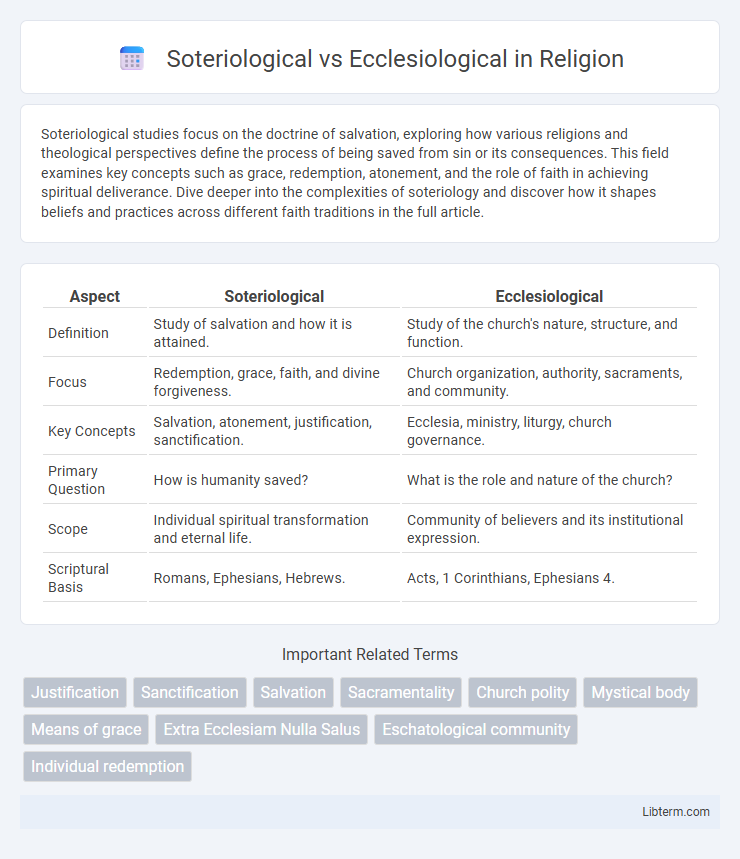Soteriological studies focus on the doctrine of salvation, exploring how various religions and theological perspectives define the process of being saved from sin or its consequences. This field examines key concepts such as grace, redemption, atonement, and the role of faith in achieving spiritual deliverance. Dive deeper into the complexities of soteriology and discover how it shapes beliefs and practices across different faith traditions in the full article.
Table of Comparison
| Aspect | Soteriological | Ecclesiological |
|---|---|---|
| Definition | Study of salvation and how it is attained. | Study of the church's nature, structure, and function. |
| Focus | Redemption, grace, faith, and divine forgiveness. | Church organization, authority, sacraments, and community. |
| Key Concepts | Salvation, atonement, justification, sanctification. | Ecclesia, ministry, liturgy, church governance. |
| Primary Question | How is humanity saved? | What is the role and nature of the church? |
| Scope | Individual spiritual transformation and eternal life. | Community of believers and its institutional expression. |
| Scriptural Basis | Romans, Ephesians, Hebrews. | Acts, 1 Corinthians, Ephesians 4. |
Introduction to Soteriology and Ecclesiology
Soteriology explores the doctrine of salvation, emphasizing the role of divine grace, atonement, and redemption through Jesus Christ. Ecclesiology studies the nature, structure, and function of the Church as the community of believers and the body of Christ. Understanding soteriology clarifies the foundation of faith, while ecclesiology defines how that faith is expressed and organized within the Church.
Defining Soteriological Perspectives
Soteriological perspectives center on the doctrine of salvation, emphasizing the means by which individuals attain eternal life through faith, grace, and divine intervention. Key theological viewpoints include justification by faith alone, sanctification processes, and the assurance of salvation, highlighting the personal and transformative relationship with God. These interpretations contrast with ecclesiological focuses, which prioritize the nature, structure, and mission of the Church as a community of believers.
Understanding Ecclesiological Frameworks
Ecclesiological frameworks analyze the structure, function, and authority of the church, emphasizing its role as a community of believers and a vehicle for divine revelation. Understanding ecclesiology involves examining key components such as church governance, sacramental practices, and its relationship to scripture and tradition. This contrasts with soteriology, which centers on the doctrines of salvation and the individual's redemption through faith and grace.
Historical Development of Soteriology
The historical development of soteriology traces the evolving understanding of salvation in Christian theology, emphasizing doctrines such as justification, sanctification, and redemption from the early Church Fathers through the Reformation and modern theological discourse. This development reflects diverse interpretations of Christ's salvific work, contrasted with ecclesiological concerns that focus on the nature, structure, and mission of the Church itself. Key figures like Augustine, Aquinas, Luther, and Calvin significantly shaped soteriological doctrine by addressing divine grace, human will, and the means of salvation in relation to ecclesial authority and community.
Evolution of Ecclesiology in Christian Thought
The evolution of ecclesiology in Christian thought traces the development of church understanding from a soteriological foundation, emphasizing salvation through Christ, toward a complex organizational and communal identity. Early Christian communities viewed the church primarily as the instrument of salvation (soteriology), while later theologians expanded ecclesiology to address governance, sacraments, and the church's role in society. This shift reflects a nuanced interplay where soteriological concerns underpin ecclesiological structures, shaping doctrines about church authority, unity, and mission.
Key Differences: Salvation vs. Church Structure
Soteriological study focuses on salvation, exploring doctrines of redemption, atonement, and eternal life through faith in Christ. Ecclesiological study analyzes church structure, governance, sacraments, and community roles within the body of believers. The key difference lies in soteriology addressing individual spiritual salvation, while ecclesiology emphasizes the organized institution and communal worship of the church.
Theological Debates: Faith, Works, and Community
Soteriological debates center on the interplay between faith and works in the process of salvation, emphasizing doctrines such as justification by faith alone versus the necessity of good works for redemption. Ecclesiological discussions focus on the nature and structure of the Christian community, examining how church authority, sacraments, and communal worship contribute to spiritual life and salvation. These theological debates highlight differing interpretations of how individual faith and communal practice integrate within the framework of Christian doctrine.
Interplay Between Salvation and the Church
Soteriological concepts emphasize salvation as the transformative work of divine grace, while ecclesiological perspectives focus on the Church as the communal body through which salvation is experienced and nurtured. The interplay between salvation and the Church reveals that the Church functions as the sacramental mediator of grace, grounding soteriological principles in communal worship and practice. Understanding this dynamic highlights how ecclesiology shapes the believer's journey toward salvation by fostering spiritual growth and doctrinal unity within the Christian community.
Contemporary Relevance and Applications
Soteriological themes emphasize salvation's transformative impact on individual spirituality, offering contemporary relevance in personal faith renewal and ethical living. Ecclesiological perspectives focus on the church's role as a communal body, influencing modern applications such as social justice initiatives and communal worship dynamics. Integrating soteriological and ecclesiological insights enhances understanding of faith's practical expressions within global religious communities.
Conclusion: Bridging Soteriology and Ecclesiology
Bridging soteriology and ecclesiology reveals how salvation (soteriology) directly influences the nature and mission of the church (ecclesiology), emphasizing that the church embodies the ongoing work of redemption through its communal worship, sacraments, and ethical witness. Integrating these theological disciplines highlights the church's role as both the recipient and agent of salvation, ensuring that doctrinal beliefs about Christ's redemptive work shape ecclesial identity and practice. This synthesis fosters a comprehensive understanding of Christian faith where personal salvation and corporate worship coalesce into a unified theological framework.
Soteriological Infographic

 libterm.com
libterm.com